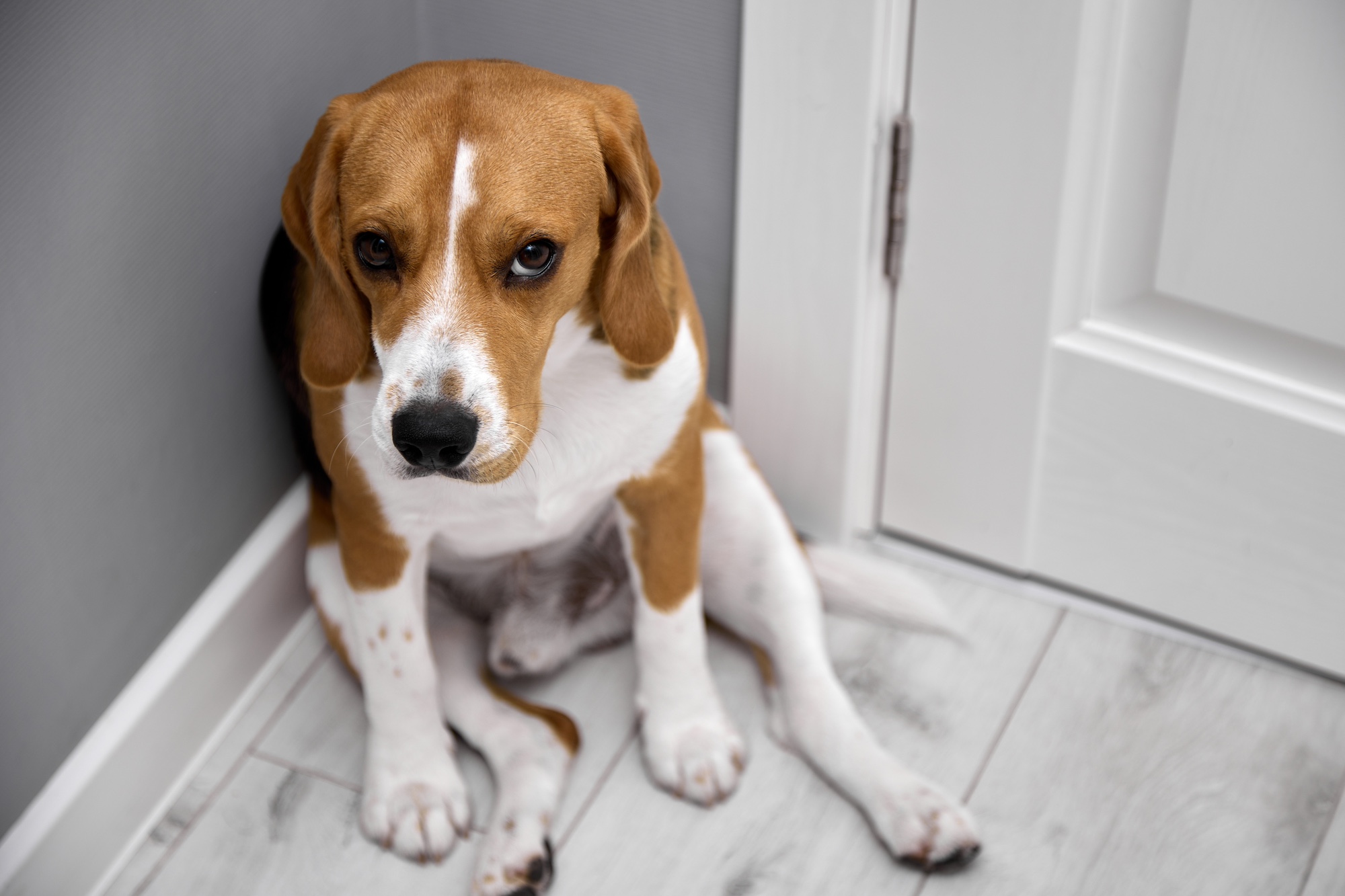Whether dogs feel guilty is a hotly contested topic among dog people. There are those who are certain that their pals experience feelings of self-reproach after raiding the trash can or tearing up a couch cushion, and those who are equally convinced that apparent signs of guilty feelings—like a hanging head or a tucked tail—actually reflect fear, submission, or appeasement.
So who’s right? Can dogs feel guilty? The short answer is that we don’t know for sure how dogs feel. But, while the question of dogs’ guilt is hard to prove beyond a reasonable doubt, we do know a lot about how they act when they do something “wrong,” and why.
A famous study found that people mistakenly identify dogs as feeling guilty
In 2009, Dr. Alexandra Horowitz, of Barnard College’s Dog Cognition Lab, studied dogs who had been told not to eat a treat in their humans’ absence. She found that participating dogs’ “guilty looks” were a response to humans scolding them, not an independent reaction to their own disobedience.
Many people interpreted these results as proof that dogs do not feel guilty. But Dr. Horowitz herself has said that this is not the case. Her study merely showed that humans misinterpreted dogs’ behavior as evidence that they felt guilty when, in fact, they were reacting to their humans’ displeasure. It did not reveal what goes on inside of dogs’ minds.
Some experts say that dogs don’t, or probably don’t, experience guilt—at least not the kind humans do
Dr. Peter Cook, an Associate Professor in the Social Psychology Division at the New College of Florida, says that whether dogs can feel guilty depends in part on what we mean when we say “guilty.” “If we mean ‘feel bad after doing something that produced a negative socioemotional response in a conspecific,’” he says, “then I’d say dogs can almost certainly clear that bar, along with many other social species.” But he’s not convinced that they feel the type of guilt most humans do. This, he says, “is akin to something like shame, and requires some aspect of judgmental self-reflection.” He doesn’t see evidence that dogs feel this emotion, and says he suspects “it would be quite a stretch.”
Dr. Stanley Coren, Professor Emeritus at the University of British Columbia, agrees that dogs don’t feel an emotion equivalent to human guilt. “I still believe,” he says, “that the key to understanding canine emotions really is based on the fact that the average dog has a mind very similar to a 2 1/2-year-old human (with the obvious language limitations).” Dr. Coren says that humans at this age haven’t yet developed the capacity for complex social emotions, and reasons that he wouldn’t expect dogs to do so either. There isn’t unanimous agreement on whether children that young can feel a type of guilt—Dr. Lori Evans, a psychologist in New York City, tells us that she believes a 2 1/2-year-old human can feel guilt—but many psychologists concur with Dr. Coren that they can’t.
To illustrate his point, Dr. Coren has written about a demonstration he once set up in which a dog showed apparent “guilty” behavior in the face of a tipped-over household garbage can—even when she wasn’t the one who had knocked it over.

Other experts say dogs may well feel guilty sometimes
Dr. Marc Bekoff, author of The Emotional Lives of Animals, does not close the door on dogs feeling guilty. In fact, he believes that they probably can. “You expect these cognitive and emotional capacities to evolve in social-living animals,” he says. In other words, dogs live and cooperate with humans and other dogs, and it’s reasonable to guess that they might have developed the ability to regret behavior that those other animals don’t like.
Anecdotally, Dr. Bekoff believes he has seen one of his dogs behave as if he might feel guilty, despite the situation at hand being novel and his not not having reprimanded the dog in any way. “I had a dog who was sick at home,” Dr. Bekoff remembers, “and he had torn up and peed on my ski parkas. And I got home. The minute he came to the door, I knew he knew he had done something ‘wrong,’ and that he felt guilty—I really believe that.” Dr. Bekoff was more concerned with his dog’s health than the condition of his ski gear, and immediately took him to the vet.
In 2019, ethologist Franz de Waal wrote in The New York Times that dogs could not be expected to feel guilt over breaking rules that humans invented, concerning matters that were only important to humans—like prohibitions designed to protect our furniture. “It would be better,” he wrote of figuring out whether dogs could experience guilt, “to test behavior that is wrong by almost any standard, including that of their own species.” He gave the example of a story in which ethologist Konrad Lorenz was accidentally bitten by his dog, who immediately showed what seemed to be signs of remorse—what Dr. de Wall describes as a “complete nervous breakdown” lasting for days, during which he ignored his food—even though he had not been scolded for his actions. Dogs, Dr. de Waal figured, have reasons to know that they shouldn’t bite someone they like, and may feel bad for doing so.

Your dog has feelings, and you shouldn’t punish them
Regardless of whether your dog is capable of an emotion similar to the guilt a person would experience, you should never punish them when they behave in a way you don’t like. This will cause them distress, and won’t improve their behavior or state of mind.
“What I want everyone to do,” says Denise Herman, founder and head trainer at Empire of the Dog in New York City, “is not be at odds with their dog, angry at their dog, and end up punishing their dog.” Not only will scolding or punishment upset your dog, but it will also make it harder for you to get the behavior you want out of them. Herman encourages humans to “get rid of the expectation that your dog understands what they’re doing wrong” when they break a human rule about sitting on the couch or making a mess. They don’t. While it’s possible that dogs are capable of feeling guilt, that emotion is not useful in training them.
Instead, use tried-and-true training methods to help them be content at home, make their stay and recall stronger, and so forth—instead of berating your dog for what you see as their mistakes, set them up for success by showing them how you would like for them to behave and making it worth their while. You probably won’t make your dog understand that you think it’s an ethical violation to grab a piece of chicken off the counter—but if you train them consistently with high-value treats, you might find that they can gladly follow “wait” and “leave it” commands.
Whether dogs can feel what we would call “guilt” is an interesting and complicated question, but the bottom line is that dogs definitely have feelings—and if you treat them kindly and try to understand their perspective, you’ll both be happier.









